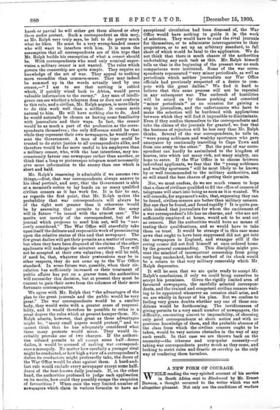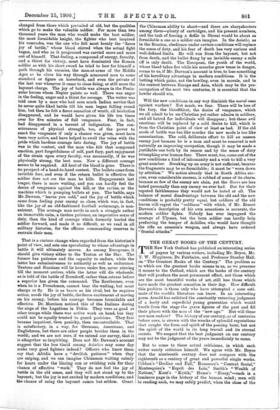A NEW FORM OF COURAGE.
WHILE reading the very spirited account of his service in South Africa sent to Blackwood by Mr. Ernest Dawson, a thought occurred to the writer which was not altogether pleasant. Not only are the conditions of warfare
changed from those which prevailed of old, but the qualities which go to make the valuable soldier. For more than two thousand years the man who would make the best soldier, the most formidable knight, the fighter who best inspired his comrades, was the one who felt most keenly the " fierce joy of battle," whose blood stirred when the actual fight began, and who as it progressed was carried more and more out of himself. That feeling, a compound of energy, ferocity, and a thirst for victory, must have dominated the Roman soldier as with his short sword he tried to hew for himself a path through his enemies, the man-at-arms of the Middle Ages as he clove his way through armoured men to some standard or figure on horseback, and even the private of the last war whenever it came to close firing, or still more the bayonet charge. The joy of battle was always in the Penin- sular heroes whom Napier paints so well. There was anger in the feeling, anger and a thirst for revenge. The writer was told once by a man who had seen much Indian service that he never quite liked battle till his men began falling round him, but then he felt a fierce sensation of wrath, all hesitation disappeared, and he would have given his life ten times over for five minutes of full vengeance. Fear, in fact, had disappeared in a torrent of indignation. The con- sciousness of physical strength, too, of the power to exact the vengeance if only a chance was given, must have been very active, and have helped to swell the veins with the pride which hardens courage into daring. The joy of battle was in the contest, and the man who felt that compound emotion, part forgetfulness of self, part fury, part enjoyment of the strain upon every faculty, was necessarily, if he was physically strong, the best man. Now a different courage seems to be required. All heat of the blood is gone. There is no prospect of a hand-to-hand contest. The bullets come from invisible foes, and even if the rat= bullet is effective the soldier does not see the man he kills. Engagements last longer, there is more waiting, and you can hardly feel the desire of vengeance against the hill, or the ravine, or the machine which is pumping bullets at you. The battle, says Mr. Dawson, " leaves you cold," and the joy of battle which came from feeling your enemy so close, which was, in fact, like the joy of an old-fashioned football scrimmage, is non- existent. The average man needs in such a struggle rather an immovable calm, a tireless patience, an imperative sense of duty, than the Lind of courage which formerly hurled the soldier forward, and made it so difficult, as we read in all military histories, for the officers commanding reserves to restrain their men.
That is a curious change when regarded from the historian's point of view, and sets one speculating to whose advantage in battle it will ultimately accrue. As among Europeans, it should give victory either to the Teuton or the Slay. The former has patience and the capacity to endure, while the latter has submissiveness to authority as well as endurance. Teutons and Russians will lie hours under fire, never stirring till the moment arrives, while the latter will die wholesale, as is told of the battle of Zorndorff, rather than retreat before a superior has given the command. The Southerner, even when he is a Frenchman, cannot bear the waiting, but must charge or fly. He is as brave as his rival, but he requires action, needs the joy of battle, the fierce excitement of moving on his enemy, before his courage becomes formidable and effective. Dr. Morrison noticed this of the Italians during the siege of the Legations in Pekin. They were as good as other troops while there was active work on hand, but they could not be equally trusted to guard positions. They first became impatient, then panicky, then uncontrollable. That is satisfactory, in a way, for Germans, Americans, and Englishmen, but there are other people besides them in the world; and we are not sure, if we extend our survey, that it is altogether so inspiriting. Does not Mr. Dawson's account suggest that the less timid among Asiatics may some day make very good fighters indeed ? Officers who know them say that Afridis have a " devilish patience" when they are sniping, and we can imagine Chinamen waiting calmly for hours under the blazing sun or swishing rain for their chance of effective " work." They do not feel the joy of battle in the old sense, and they will not stand up to the bayonet; but the joy is not excited by modern conditions, and the chance of using the bayonet comes but seldom. Grant
the Chinaman ability to shoot—and there are sharpshooters among them—plenty of cartridges, and his present numbers, and the task of forcing a defile in Shensi would be about as formidable a one as a soldier can imagine. In the Asiatic, as in the Russian, obedience under certain conditions will replace the sense of duty, and his fear of death has very curious and well-defined limits. He will run from the bayonet, but not from death, and the bullet flung by an invisible enemy a mile off is only death. The European, the youth of the world, whose blood takes fire while his muscles grow tense in danger, seems to us, if Mr. Dawson's account is true, to lose something of his hereditary advantage in modern conditions. It is the batting which gains, not the bowling, even in morale, and in the contest between Europe and Asia, which may be the pre- occupation of the nest two centuries, it is essential that the bowler should win.
Will the new conditions in any way diminish the moral case against warfare ? Not much, we fear. There will be less of the fury, the bloodthirst, the desire of vengeance, which we all admit to be un-Christian yet rather admire in soldiers, and all hatred for individuals will disappear; but these evil emotions will be replaced by a cold desire to kill, which is from the Christian point of view at least as bad. If the old mode of battle was too like murder the new mode is too like assassination. The cold, deliberate effort to kill an unseen enemy just because he is a man and must be removed is not naturally an improving occupation, though it may be made a justifiable one both by its reason and by the sense of duty triumphing over human fear. There must, too, come out of the new conditions a kind of inhumanity and a wish to kill a very great number. Breaking up an army is not sufficient, because the fragments may be so formidable ; it must be " worn down by attrition." We notice already that in South Africa suc- cess, even considerable success, is robbed of some of its charm because so few of the enemy are slain, yet the Boers are less hated personally than any enemy we ever had. But for their reputed faithlessness they would not be hated at all. The balance of moral disadvantage between the old and the new conditions is probably pretty equal, but soldiers of the old leaven will regret the " coldness " with which, if Mr. Ernest Dawson's description of his own sensations is accurate, the modern soldier fights. Nobody has ever impugned the courage of Ulysses, but the born soldier can hardly help preferring the temper of Achilles, who would have thought the rifle an assassin's weapon, and always have ordered "frontal attacks."















































 Previous page
Previous page